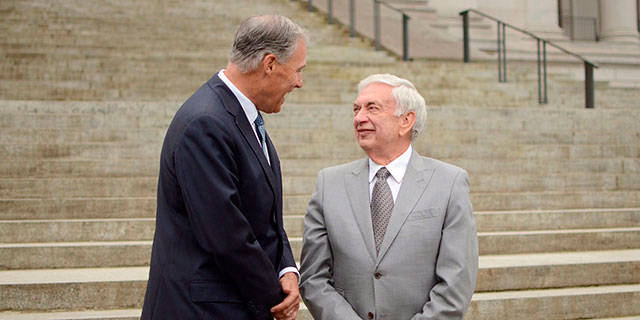Former Washington Gov. Mike Lowry, 78, who also served as a King County Council member, died on Monday from complications of a stroke.
Gov. Jay Inslee issued the following statement about Lowry:
“Trudi and I send our sincere condolences to the Lowry family and friends,” Inslee said in a media release. “Mike Lowry served with compassion and humility. He had a big heart and cared deeply about the people of this state.
“Mike led efforts in the 1990s to provide health care for all Washingtonians, and his work lives on today through coverage for low-to-moderate income families. After he left public service, Mike continued to be a force for good through his involvement in many nonprofit organizations and charitable causes, including those delivering services to the homeless and providing housing for migrant workers.
“Mike will be missed, and I know all Washingtonians join me in keeping him and his family in our hearts.”
The family of Lowry issued the following press release:
Lowry held public office in Washington for 19 years. He was elected to the King County Council in 1975, and four years later began serving in the U.S. House of Representatives, where he spent the next 10 years. Lowry was Washington governor from 1993 to 1997.
Lowry was a passionate defender of fairness for people and the environment. He was known as a courageous leader who was often willing to take early stands on sometimes controversial issues, and this courage plus his straight-forward nature garnered respect from those in all political parties.
Lowry’s initial legislation in Congress was the nation’s first proposal to provide restitution for more than 110,000 Japanese Americans and Aleuts interned in prison camps during World War II. Also as a newly elected U.S. House member, Lowry fought to uphold century-old Indian treaties and U.S. Supreme Court decisions to protect Indian fishing rights.
Lowry was the leader in passage of the 1984 Washington Wilderness Act. And he worked with Washington’s congressional delegation to designate the Olympic Coast National Marine Sanctuary, which stretches from just north of Grays Harbor to Cape Flattery and extends 25 to 50 miles off the coast. The designation protected extensive kelp beds, whales, dolphins, porpoises, fish and seabirds.
Always caring about the vulnerable, Lowry had a major impact in advocating for some of the earliest appropriations to address the AIDs crisis. He also spearheaded efforts in Congress to help the homeless.
While governor, Lowry emphasized health care, welfare policies, supportive housing, and in 1995 called a special session to secure funding for what is now Safeco Field. He pioneered health care reform for the state and also was active in education and civil service reform.
A life-long democrat, Lowry had strong relationships across party lines and drew support from people across the state, many saying they respected him because they always knew where he stood. In 1989 he founded and co-chaired the WA Wildlife and Recreation Coalition with former Gov. Dan Evans.
After leaving office, Lowry worked pro-bono on numerous non-profit organization projects. He launched and headed the Washington Agricultural Families Assistance, WAFA, which is building homes for farm worker family home ownership in central Washington.
Mike Lowry was born in the Whitman County town of St. John, where his family had first homesteaded in 1882. He graduated from Endicott High School and from Washington State University in Pullman.
He was preceded in death by his parents Robert and Helen Lowry and sister and brother-in-law Beth and Orman Vertrees. Survivors include his wife Mary Lowry; daughter Diane Lowry Oakes; son-in-law Scott Oakes; grandsons Tyler and Lucas Oakes; sister Suellen Lowry; nephews Keith Vertrees and Matthew Hibschman; and niece Ann Vertrees.



